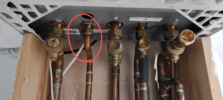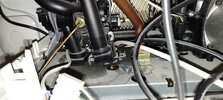Good Morning,
I'm hoping anyone can shed any advice before I have to get a plumber in, but I want to try and know what could be going on beforehand as I am at a loss what could be going on. A bit of brief information first, I live in a dormer bungalow and the boiler is situated upstairs in the WC, there are 10 radiators downstairs (approx half of them are only small) & 4 radiators upstairs. The boiler dates back to around 2010/2011.
I've been having a problem with the boiler losing pressure, but this week this seems to have got much worse to the point I have been having to repressurise daily - sometimes twice, the needle will litterally go to the bottom pin. The boiler does still function though other than gargling a bit when it first starts up, all downstairs radiators have no air in them, the upstairs though before repressurising will lose some air but no water comes out, in the WC their is a towel rail which is a similar height to the boiler so I actually removed the bleed valve from that and could observe that on each ocassion I did this there was still a considerable amount of water in the radiator except for the top two rungs. Obviously as the water heats up water does then start coming out of the bleed valve if I check when the heating is/has been running.
This made me start wondering if it could be the expansion vessel, so I've checked the copper pressure relief pipe outside the property and this has always been bone dry. I'd been reading some people also suggested it could be the heat exchanger that could have a leak, and in this case water would exit through the condensate pipe, so a couple of nights ago I disconnected this and placed the pipe into a bucket, the following morning it was still empty, however I don't think I repressurised the system when doing this.
I'd also read that if you repressurise the system and then isolate the boiler flow & return and monitor for any pressure loss this would indicate whether the boiler may have a fault or if potentially there may be a leak with the central heating pipework. So last night I did this and this morning woke up to a puddle on the floor underneath the boiler with some pressure loss (perhaps 0.2 bar) - I checked the upstairs radiators and they were all still full of water. I wanted to make sure that the boiler hadn't been flooded out, so did remove the case just to visually check and luckily there wasn't a massive amount of water around, it does appear to be coming from around where the heat exchanger is though and exiting where the hot water supply pipe is (but not from the actual pipe itself).
Now I did also just check around the schrader valve on the vessel and quickly pressed it with a screwdriver, air did come out, but some black water too, so I don't think that is a good sign? Just really not sure what happens if an expansion vessel fails where the water goes if this is not coming out of the pipe outside?
I have now reversed the isolation on the flow and return pipework & observed a slight pressure loss on the gauge probably due to whatever has left the boiler overnight, and also sat the condensite pipe in a bucket again whilst the pressure is about 1.2 bar just to see if any water does come out whilst the boiler is powered off. The case is now back on the boiler and haven't done anything else with this.
I am not ruling out a potential leak on a central heating pipe somewhere though, as we have changed two radiators downstairs from Type 11 to Type 22 back in early November and achieved this by using some compression elbows rather than having to lift sections of the floor up, and everything did seem OK this past few weeks however. Although it is interesting that the radiators upstairs were all still this morning though after isolating the boiler flow/return pipes.
Would appreciate any input from anyone.
Thanks
I'm hoping anyone can shed any advice before I have to get a plumber in, but I want to try and know what could be going on beforehand as I am at a loss what could be going on. A bit of brief information first, I live in a dormer bungalow and the boiler is situated upstairs in the WC, there are 10 radiators downstairs (approx half of them are only small) & 4 radiators upstairs. The boiler dates back to around 2010/2011.
I've been having a problem with the boiler losing pressure, but this week this seems to have got much worse to the point I have been having to repressurise daily - sometimes twice, the needle will litterally go to the bottom pin. The boiler does still function though other than gargling a bit when it first starts up, all downstairs radiators have no air in them, the upstairs though before repressurising will lose some air but no water comes out, in the WC their is a towel rail which is a similar height to the boiler so I actually removed the bleed valve from that and could observe that on each ocassion I did this there was still a considerable amount of water in the radiator except for the top two rungs. Obviously as the water heats up water does then start coming out of the bleed valve if I check when the heating is/has been running.
This made me start wondering if it could be the expansion vessel, so I've checked the copper pressure relief pipe outside the property and this has always been bone dry. I'd been reading some people also suggested it could be the heat exchanger that could have a leak, and in this case water would exit through the condensate pipe, so a couple of nights ago I disconnected this and placed the pipe into a bucket, the following morning it was still empty, however I don't think I repressurised the system when doing this.
I'd also read that if you repressurise the system and then isolate the boiler flow & return and monitor for any pressure loss this would indicate whether the boiler may have a fault or if potentially there may be a leak with the central heating pipework. So last night I did this and this morning woke up to a puddle on the floor underneath the boiler with some pressure loss (perhaps 0.2 bar) - I checked the upstairs radiators and they were all still full of water. I wanted to make sure that the boiler hadn't been flooded out, so did remove the case just to visually check and luckily there wasn't a massive amount of water around, it does appear to be coming from around where the heat exchanger is though and exiting where the hot water supply pipe is (but not from the actual pipe itself).
Now I did also just check around the schrader valve on the vessel and quickly pressed it with a screwdriver, air did come out, but some black water too, so I don't think that is a good sign? Just really not sure what happens if an expansion vessel fails where the water goes if this is not coming out of the pipe outside?
I have now reversed the isolation on the flow and return pipework & observed a slight pressure loss on the gauge probably due to whatever has left the boiler overnight, and also sat the condensite pipe in a bucket again whilst the pressure is about 1.2 bar just to see if any water does come out whilst the boiler is powered off. The case is now back on the boiler and haven't done anything else with this.
I am not ruling out a potential leak on a central heating pipe somewhere though, as we have changed two radiators downstairs from Type 11 to Type 22 back in early November and achieved this by using some compression elbows rather than having to lift sections of the floor up, and everything did seem OK this past few weeks however. Although it is interesting that the radiators upstairs were all still this morning though after isolating the boiler flow/return pipes.
Would appreciate any input from anyone.
Thanks
Attachments
Last edited:



